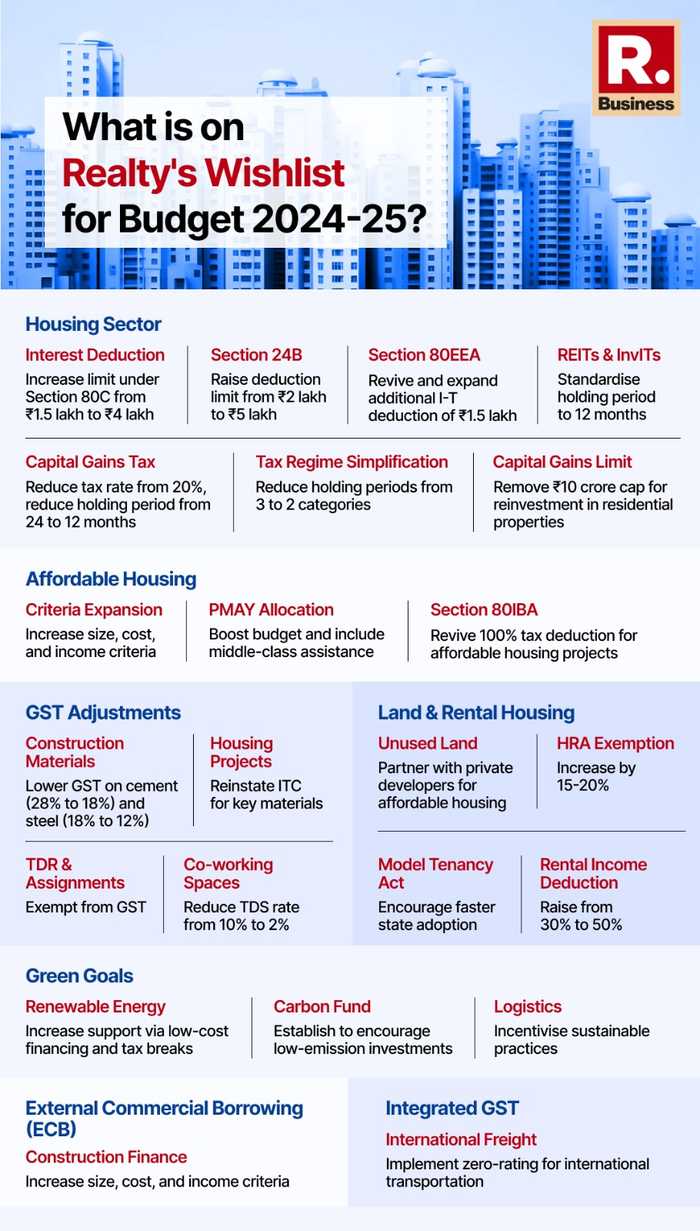Published 13:16 IST, July 17th 2024
What does the real estate sector expect from Budget 2024?
As India prepares for the Budget, the sector seeks more tax deductions on housing loans and benefits for first-time homebuyers, and further reforms.
Advertisement
Union Budget 2024-25: As India prepares for the Union Budget 2024-25, the real estate sector is advocating for significant reforms and policy measures to address pressing issues and foster growth across various segments. Experts and stakeholders have outlined recommendations aimed at stimulating the housing market and supporting sustainable development.

Bold tax reform proposal
Anshuman Magazine, Chairman & CEO, CBRE (India) has articulated a series of critical proposals. He suggests revising the interest deduction limit on housing loans under Section 80C of the Income Tax Act from Rs 1.5 lakh per annum to at least Rs 4 lakh. They propose moving this deduction out of Section 80C to ensure it receives adequate attention independent of other financial instruments.
Advertisement
To further incentivise homeownership, CBRE recommends increasing the interest deduction limit under Section 24B from Rs 2 lakh per annum to Rs 5 lakh per annum. This adjustment is seen as necessary given the long-standing stagnation of these limits, which have not kept pace with inflation.
First-time buyer benefits
The government should revive and expand the additional income tax deduction of Rs 1.5 lakh for first-time homebuyers under Section 80EEA. They advocate extending this benefit to cover the mid-end housing segment, emphasising the need for inclusive policies tailored to different income levels and regional dynamics.
Advertisement
Regarding long-term capital gains tax on house property, CBRE proposes reducing the current 20 per cent tax rate and shortening the qualification period from 24 months to 12 months. They also recommend removing the Rs 2 crore cap on capital gains for reinvestment in two properties, aiming to stimulate investment in real estate.
GST reform for construction
Notably, GST rationalisation is also a demand by experts, specifically lowering the rates on construction materials like cement and steel, currently taxed at 28 per cent and 18 per cent, respectively. They stress the importance of reintroducing input tax credit (ITC) for housing projects to ease cost burdens on developers and ultimately on homebuyers.
Advertisement
Experts urge the government to unlock unused government land parcels in partnership with private developers to boost affordable housing initiatives. Additionally, experts advocate for incentivising rental housing through a proposed 5-year property tax holiday and improved access to capital for build-to-lease and rent-to-own projects.
Furthermore, there is a strong call for supporting renewable energy adoption with financial incentives and enhancing infrastructure for smart grids, aiming to align with sustainable development goals and boost environmental conservation efforts.
Advertisement
Affordable housing urgencies
G Hari Babu, National President, NAREDCO, echoed CBRE's call for sustained support for affordable housing initiatives. He stressed the urgency of reintroducing input tax credit (ITC) under GST and expanding the SWAMIH fund with a Rs 50,000 crore corpus to stabilise the market.
"The finance ministry should come up with the second tranche of the Special Window for Affordable and Mid-Income Housing (SWAMIH) fund with Rs 50,000 corpus in the upcoming union budget for FY 2024-2025, along other budgetary support and relaxations including allowing input tax credit under GST and incentives for rental housing in order to achieve the housing for all target," he said.
Incentivising rental housing
Niranjan Hiranandani stressed the importance of incentivising rental housing and granting infrastructure status to housing projects, especially townships. He believes these steps are critical for promoting sustainable development and economic growth in the real estate sector.
"Even in the richest country of the world, the United States, at least 50 per cent of people live in rental housing. But there is no income tax benefit to create rental housing. And hence, and the poorest of the poor, my driver, my servant, cannot buy a house immediately. He needs rental housing, hence some incentivisation in the budget is required for governments as well as private agencies, private companies, developers and individuals, and even NBFCs to actually build affordable rental housing," Hiranandani added.
As the budget announcement draws near, these recommendations from experts highlight the sector's readiness for policy measures that can propel India's property market towards inclusive growth and sustainability.
12:34 IST, July 16th 2024